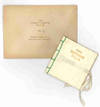
Spenser's Faery Queen.
by Edmund Spenser
- Used
- Fine
- Hardcover
- Condition
- Fine
- Seller
-
Scarborough , North Yorkshire, United Kingdom
Payment Methods Accepted
About This Item
Tan calf binding with red and blue marbled boards. Black title plate with gilt lettering, banding and decoration on the spine. From the Chandos Classics Library published circa 1868.
The Faery Queene is an English epic poem by Edmund Spenser. Books I–III were first published in 1590, then republished in 1596 together with books IV–VI. The Faerie Queene is notable for its form: at over 36,000 lines and over 4,000 stanzas it is one of the longest poems in the English language; it is also the work in which Spenser invented the verse form known as the Spenserian stanza. On a literal level, the poem follows several knights as a means to examine different virtues, and though the text is primarily an allegorical work, it can be read on several levels of allegory, including as praise (or, later, criticism) of Queen Elizabeth I. In Spenser's "Letter of the Authors", he states that the entire epic poem is "cloudily enwrapped in Allegorical devices", and that the aim of publishing The Faerie Queene was to "fashion a gentleman or noble person in virtuous and gentle discipline". Spenser presented the first three books of The Faerie Queene to Elizabeth I in 1589, probably sponsored by Sir Walter Raleigh. The poem was a clear effort to gain court favour, and as a reward Elizabeth granted Spenser a pension for life amounting to £50 a year, though there is no further evidence that Elizabeth I ever read any of the poem. This royal patronage elevated the poem to a level of success that made it Spenser's defining work.
Edmund Spenser (1552/1553 – 13 January 1599) was an English poet best known for The Faerie Queene, an epic poem and fantastical allegory celebrating the Tudor dynasty and Elizabeth I. He is recognized as one of the premier craftsmen of nascent Modern English verse and is often considered one of the greatest poets in the English language. Though Spenser was well-read in classical literature, scholars have noted that his poetry does not rehash tradition, but rather is distinctly his. This individuality may have resulted, to some extent, from a lack of comprehension of the classics. Spenser strove to emulate such ancient Roman poets as Virgil and Ovid, whom he studied during his schooling, but many of his best-known works are notably divergent from those of his predecessors. The language of his poetry is purposely archaic, reminiscent of earlier works such as The Canterbury Tales of Geoffrey Chaucer and Il Canzoniere of Francesco Petrarca, whom Spenser greatly admired. An Anglican and a devotee of the Protestant Queen Elizabeth, Spenser was particularly offended by the anti-Elizabethan propaganda that some Catholics circulated. Like most Protestants near the time of the Reformation, Spenser saw a Catholic church full of corruption, and he determined that it was not only the wrong religion but the anti-religion. This sentiment is an important backdrop for the battles of The Faerie Queene. Spenser was called "the Poet's Poet" by Charles Lamb, and was admired by John Milton, William Blake, William Wordsworth, John Keats, Lord Byron, Alfred Tennyson and others. Among his contemporaries Walter Raleigh wrote a commendatory poem to The Faerie Queene in 1590, in which he claims to admire and value Spenser's work more so than any other in the English language. John Milton in his Areopagitica mentions "our sage and serious poet Spenser, whom I dare be known to think a better teacher than Scotus or Aquinas". In the eighteenth century, Alexander Pope compared Spenser to "a mistress, whose faults we see, but love her with them all."
Reviews
(Log in or Create an Account first!)
Details
- Bookseller
- Martin Frost
(GB)
- Bookseller's Inventory #
- FB940 /str shlf
- Title
- Spenser's Faery Queen.
- Author
- Edmund Spenser
- Format/Binding
- Calf spine with marbled boards.
- Book Condition
- Used - Fine
- Quantity Available
- 1
- Binding
- Hardcover
- Publisher
- Frederick Warne & Co.
- Place of Publication
- London
- Date Published
- Circa 1868
- Size
- 13 x19 x3cm
- Weight
- 0.00 lbs
Terms of Sale
Martin Frost
About the Seller
Martin Frost
About Martin Frost
Glossary
Some terminology that may be used in this description includes:
- Calf
- Calf or calf hide is a common form of leather binding. Calf binding is naturally a light brown but there are ways to treat the...
- Gilt
- The decorative application of gold or gold coloring to a portion of a book on the spine, edges of the text block, or an inlay in...
- Spine
- The outer portion of a book which covers the actual binding. The spine usually faces outward when a book is placed on a shelf....
- Marbled boards
- ...
- Plate
- Full page illustration or photograph. Plates are printed separately from the text of the book, and bound in at production. I.e.,...
This Book’s Categories
Also Recommended
-

Save 10% on every purchase!
Join the Bibliophiles’ Club and start saving 10% on every book.
$29.95 / Year









